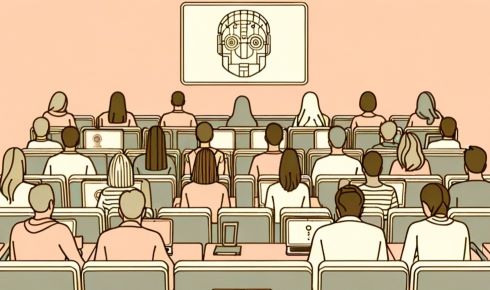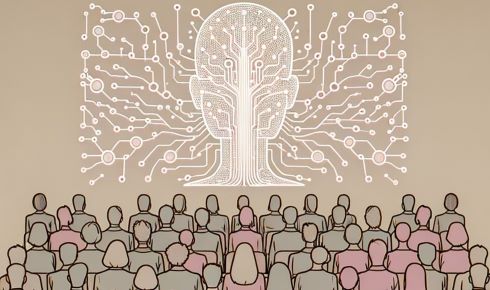Machine learning

23rd February 2024
How the RSB and other organisations are working to understand the opportunities and risks of AI in education
Can you imagine a future where artificial intelligence (AI) intervenes in the decision of a prospective student being accepted at a university? Or where students’ faces are monitored by AI to see if they have understood a topic? Well, that future is already here: those are just a couple of examples of how AI has already been deployed in universities in the UK and US – and the list is growing longer all the time1, 2.
The field of artificial intelligence has progressed steadily since the American physicist John Vincent Atanasoff created the first electronic digital computer in the 1940s. But 2023 saw an explosion of AI and generative AI (genAI) tools, many of which are free to access. These systems are trained on vast amounts of labelled data, which they analyse and use to generate statistically probable outputs when given the right prompt.
Tools such as ChatGPT and DALL·E, both developed by the research organisation OpenAI, generated huge public interest, with their uncanny ability to generate human-like answers to complex questions and make artistic images based on any prompt, respectively.
AI is quickly permeating multiple aspects of our lives, including education. Even if certain tools weren’t designed specifically for education, they are being repurposed for use in this sector. Teachers and students across the world and in all stages of education have already started using AI tools in a huge variety of ways.
Apart from the ethically dubious examples mentioned at the beginning of this article, educators are using them to help with scheduling, create course materials such as exam questions, study questions or reading lists, or to generate essays and answers that students can critique. Students use them for perfecting grammar and to help them understand complicated concepts or structure essays.
Government position on AI
In March last year, the UK’s Department for Education (DfE) set out its position on the use of genAI in education in a statement, commenting on both the challenges and opportunities that these fast-moving developments might bring to the education community.
To gather data on the thoughts of educators on the topic, the DfE then launched a call for evidence, to which the RSB responded after collecting opinions from its education-focused groups and committees³. Members of these groups largely agreed that AI could be a useful tool both for educators and students, but they were concerned about students using AI to cheat or accessing inaccurate information. Furthermore, they were worried about the lack of training and support for teachers who wanted to use AI.
The DfE published the outcome of its call for evidence in November 20234. Most of the respondents were teachers, across all levels of education, who had already adopted the use of genAI and thought it could be beneficial for things like freeing up teacher time and providing additional educational support.
However, they also expressed some concerns, such as the need to adapt the curriculum for the challenges of genAI, and the potential for children to access or create harmful or inappropriate content, plus the importance of providing equal access to this technology.
 Teachers and students across the world and in all stages of education have already started using AI tools in a huge variety of ways. The images in this article were generated by an AI-illustration tool.
Teachers and students across the world and in all stages of education have already started using AI tools in a huge variety of ways. The images in this article were generated by an AI-illustration tool. The DfE expressed its determination to maximise the opportunities to use genAI in education while addressing its risks and challenges. For this, the DfE is investing up to £2m in the Oak National Academy to improve and expand its AI tools for teachers5.
The DfE aims for all schools to have access to a high-speed connection by 2025, for which it will provide up to £200m to upgrade schools that fall below its wi-fi connectivity standards6. In addition, the DfE is collaborating with the Office of Qualifications and Examinations Regulation, the Office for Standards in Education and the Office for Students on a joined-up approach to the use and regulation of genAI in education.
RSB work on AI
The education policy team at the RSB wanted to understand more about how AI is being used in biology education specifically, and we have been surveying biology teachers across all stages of education on the topic. Most of our respondents had used it, especially the ones working in higher or tertiary education. Common uses included scheduling lessons, drafting emails or designing course material, such as images for slides or exam questions.
Views about the use of genAI in biology education were generally positive, and respondents mentioned benefits such as the potential for AI to reduce teacher workloads and to help make education more personalised.
Respondents also expressed the same concerns as above, such as the risk of plagiarism and cheating by students, and how tools that operate under paid subscription could increase inequalities.
Some respondents were also worried about ethics and safety; for example, the problem of AI-generated content infringing on copyright, or students uploading personal data or images that are then used inappropriately. Some commented that the ethical use of AI should be introduced into the school curriculum.
For now, the RSB will keep working on understanding the full potential of the use of AI in biology education and advocating for the safe use of AI. We can of course ask ChatGPT itself to tell us what the future holds for the use of AI in biology education.
“In the future, AI is set to transform biology education through personalised learning, adaptive assessments, and lifelike simulations. Students will benefit from virtual labs, surpassing physical limitations, with natural language processing aiding in clear communication of complex concepts.
AI’s analytical capabilities will enhance bioinformatics and data analysis, deepening comprehension of intricate biological systems. Collaborative tools will create a global learning community, yet ethical considerations and human oversight are crucial for responsible and fair AI integration in biology education.”
Whether you agree with ChatGPT’s answer or not, AI is already part of our day-to-day lives and, as with every other technological revolution, we will need to embrace it and learn how to make the best use of it, especially in education.
1) Newton, D. From admissions to teaching to grading, AI is infiltrating higher education (hechingerreport.org)
2) Nigam, A. et al. A systematic review on AI-based proctoring systems: past, present and future. Educ. Inf. Technol. 26, 6421–6445 (2021).
3) Written evidence submitted to the Department for Education’s consultation considering generative artificial intelligence in education. RSB, August 2023. See rsb.org.uk/policy/consultations/consultation-responses
4) Generative AI in education call for evidence: summary of responses. DfE, November 2023.
5) New support for teachers powered by Artificial Intelligence – GOV.UK (www.gov.uk).
6) Education investment areas – GOV.UK (bit.ly/govt-support).
Paula Martin de Prado is an RSB policy intern and a PhD student at the University of Warwick.


